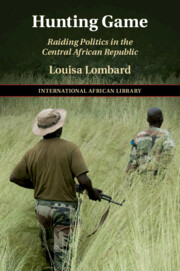Book contents
- Hunting Game
- The International African Library
- Hunting Game
- Copyright page
- Contents
- Figures
- Maps
- Acknowledgements
- Abbreviations and acronyms
- Map
- 1 Force, status, and uncertainty in the arts of acquisition
- 2 Zariba contests and collaborations
- 3 Manhunts persist in an unfortunate colony
- 4 Big-game hunting and regulatory sociality
- 5 The limits of law in coercive conservation
- 6 Camouflage skills
- 7 Denunciation and liberty
- 8 Force and status in rebellion
- 9 Sovereignty and distribution amid forceful acquisition
- References
- Index
- Titles in the series
3 - Manhunts persist in an unfortunate colony
Published online by Cambridge University Press: 20 April 2020
- Hunting Game
- The International African Library
- Hunting Game
- Copyright page
- Contents
- Figures
- Maps
- Acknowledgements
- Abbreviations and acronyms
- Map
- 1 Force, status, and uncertainty in the arts of acquisition
- 2 Zariba contests and collaborations
- 3 Manhunts persist in an unfortunate colony
- 4 Big-game hunting and regulatory sociality
- 5 The limits of law in coercive conservation
- 6 Camouflage skills
- 7 Denunciation and liberty
- 8 Force and status in rebellion
- 9 Sovereignty and distribution amid forceful acquisition
- References
- Index
- Titles in the series
Summary
Although colonial officials had very little money, their superiors nevertheless demanded that certain tasks be accomplished. In particular, they required labour. And since most Africans were uninterested in exchanging their labour for the special-use currencies the French were offering, labour had to be acquired through force. Manhunting therefore became colonial officials’ major undertaking during the colony’s early decades, particularly in the hunting zone. The cruelty of manhunting and of the way in which labour was squeezed from the captured comes across as scandalous today; it did for many at the time as well. Many Europeans involved with manhunting experienced the tension between the future-oriented goals justifying their presence and the actual practices they engaged in (or allowed, or did not punish) as conflicts of values. The conflicts stemmed in part from the multiple arenas in which they sought to be effective actors: how what happened in the Central African interior was perceived by imperial institutions and audiences, and the unfolding of interpersonal relations in the interior where manhunting was necessary to acquisition and exploitation. In neither arena was law much of a guide to action. Instead, ambitious colonial officials learned the skill of camouflage: managing the faces they showed to different audiences so that their practices would not stand out as questionable. Along the way, manhunts entrenched a simultaneously acquisitive and neglectful way of thinking about the value and status of other people.
- Type
- Chapter
- Information
- Hunting GameRaiding Politics in the Central African Republic, pp. 60 - 87Publisher: Cambridge University PressPrint publication year: 2020

